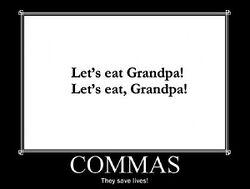Commanism: in grammar
Commanism (Latin: Commanismus) is a grammatical system used in the English language which involves structuring a sentence by the use of commas so that every part of the sentence has equal weight and equal meaning to another part. Thus Commanism helps keep every word in every sentence equal and therefore fair. Its first use in the English language came from the Norman technique of separating English sentences out with pauses in between the sections so that they could pronounce the English better in their ridicule French accents. Karl Punctuation Marx invented the extremist form of Commanism that we all know today.
“What[']s the point in punctuation if no one ever uses it[?]”
Grammatical Capitalism In Review[edit]
- People who benefit the most from ideology: Powerful people, the Government.
- Political Spectrum Position: Far left - Between Mitt Romney and Darth Vader.
- Opposing Ideologies: Capitalism, Extremalationism, Free Speechmarksinism.
- Main Supporters: North Korea, George Bush, The Left-Wing Association of Commas.
Advantages of Commanism[edit]
Commanism allows every word to have equal meaning, presence, and, truth. It does not allow one part, of a sentence to outweigh another. It therefore puts a comma in the middle of each sentence s,o that both parts of the sentence have equal numbers of words. In the world of Commanism writers have no freedom to write what they want as what if they wrote something innapropriate with unbalanced pause in the, sentence. Therefore the government has full control over, what writers think, write, and, publish. There are no "boom" or "bust" times so a writer can publish the government's their, work continuosly without having to worry about rising prices or lack of customers as everyone is forced encouraged to read the writer's work.
Disadvantages of Commanism[edit]
There is nothing to distinguish anyone's work from another's work so the people incharge in the government representative of the population want their work to shine as they have more power equal rights. The famous Commanist, George Orwell, invented a rule to overcome this problem:
“All words are equal. But some are more equal than others.”
People, in, government, could, now, make, their, words, even, more, equal, and, therefore, fairer, and, therefore, better, than, anyone, else's, words. This, was, a, huge, success, for, the, oligarchical, upper, class, equal, leaders, of, a, Commanist, country.
After a while there is n,o incentive to write anything complicated. So sentence, become simple. Writing is, become poor. No one, bother read. Writer bother not with comma. Industrial production of word collapse as no incentive to write more. Country bankrupt. Speling pore. By-buy wourds...

